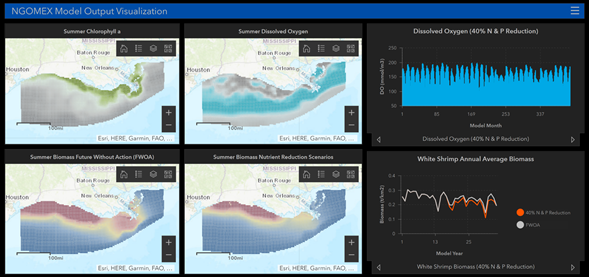The third Advisory Panel Workshop on Hypoxia Effects of Fish and Fisheries was held virtually on December 14, 2020 as part of an NCCOS NGOMEX project led by Dr. Kim de Mutsert of The University of Southern Mississippi. The project team provided modeling updates and introduced an updated output visualization tool to the advisory panel integral to the project.
Visualization Tool: Dr. Kristy Lewis from the University of Central Florida and her PhD student Michelle Shafer introduced the beta version of the output visualization tool (see figure 1) that is currently able to show output from the Ecospace model developed by Dr. de Mutsert and the biophysical model developed by Drs. Katja Fennel and Arnaud Laurent from Dalhousie University. The tool allows the user to select a nitrogen and phosphorus load reduction scenario (the amount of nitrogen and phosphorus that enters the Gulf of Mexico from the Mississippi River), and a fish or shellfish species. Maps and line graphs will then show the concentration and distribution of Chl a and dissolved oxygen, and the biomass and distribution of the selected species in the Northern Gulf of Mexico. The output will show the selected scenario compared to a future without action at the end of a 34-year simulation.

Katie Flahive from the US EPA and the Hypoxia Task Force confirmed the utility of the tool to the Task Force and advised the Panel and PIs on how to best roll-out the visualization tool to the Task Force and other Stakeholders.
Learn more about de Mutsert Fish Ecology Lab visualizations here.
Modeling: Dr. de Mutsert updated the panel on the latest progress on an Ecospace model that simulates effects on fish and fisheries in the Gulf of Mexico of nitrogen and phosphorus reductions in the Mississippi River nutrient loading. The model was recalibrated after obtaining new information for time series data from stock assessment, and the model area was improved with a more detailed coastline. Dr. Stephen Brandt from Oregon State University updated the panel on the latest results of bioenergetic models that simulate the same scenarios in a multi-model approach.
See more de Mutsert Fish Ecology Lab ecosystem modeling here,
Other Workshop Topics: Dr. de Mutsert further updated the panel on collaborative efforts with other NGOMEX PIs to work on overview papers summarizing scientific outcomes and management applications of all three current NGOMEX projects, and the development of a themed issue in the scientific journal Marine and Coastal Fisheries centered around hypoxia effects on fish and fisheries in the Gulf of Mexico
Dr. de Mutsert’s PhD student Sara Marriott presented results of a panel survey requesting what project outcomes would be most useful to resource managers and other stakeholders.
A discussion led by Dr. Matt Campbell from NOAA SEFSC Pascagoula lab included valuable feedback on the project and the visualization tool.
Updates from Dr. Mandy Karnauskas from the NOAA SEFSC Miami lab provided information on the formation of an Ecosystem Technical Committee by the Gulf Council and the development of a Fishery Ecosystem Plan that both align well with the current project.
Among the 23 workshop participants were representatives of NOAA’s Southeast Fisheries Science Center (SEFSC), the Hypoxia Task Force, and the Gulf States Marine Fisheries Commission among others.
Meeting notes, project updates and presentations can be found on the de Mutsert Lab project website.
Previous workshops were held June 2019 and February 2017. This work is supported through the NCCOS NGOMEX project “User-Driven Tools to Predict and Assess Effects of Reduced Nutrients and Hypoxia on Living Resources in the Gulf of Mexico.”
